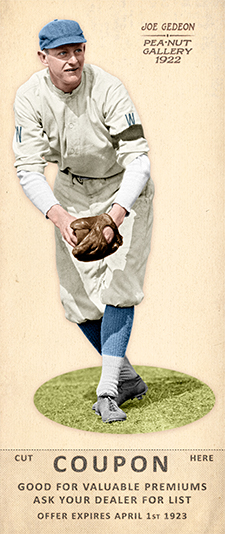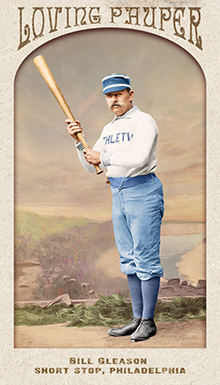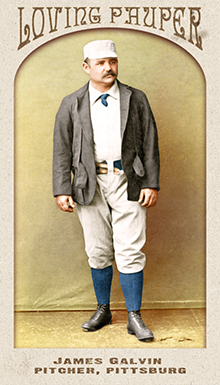
- Series: 1919 Black Sox Scandal
- City: Washington, D.C.
- Team: Senators
- League: American League
Elmer Joseph Gedeon (1893-1941) became an unwelcome footnote to the most notorious scandal in baseball history. Judge Kenesaw Mountain Landis had permanently banned eight White Sox players in the aftermath of the 1919 World Series affair. A few months later, Landis ousted young Joe, a slick-fielding second-baseman for the St. Louis Browns. The bad boy from the PCL, who had defied Clark Griffith over his rookie assignment, had refused to get off a train in a snowstorm, and had dismissed the stately Charlottesville hometown of Thomas Jefferson and James Madison as “a rotten little mud town down in Virginia,” ended up as the “ninth man out.” Landis found Gedeon had “guilty knowledge” of the conspiracy to fix the Series. Thus ended the rising career of one of the best defensive players at his position and a canny batter, especially skilled in the hit and run.
- Gedeon played for the Senators, Yankees and Browns. His friendship with one too many White Sox players and way too many St. Louis gamblers put him in harm’s way
- Became the first of the banished players to die, at age 47, back home in California
- Series: 1919 Black Sox Scandal
- City: Chicago
- Team: White Sox
- League: American League
Charles Arnold Gandil (1888-1970) was described in the Chicago Tribune in March 1917 as “the ideal type of athlete – a fighter on the field, a player who never quits under the most discouraging circumstances and … is one of the most dangerous batters in the league when a hit means a ball game.” This tribute heralded Gandil’s return to his original club, Charles Comiskey’s White Sox. He didn’t set the world on fire in ’17 and ’18 but the club became a strong favorite to win it all in 1919. Rife with dissension directed at the miserly owner, by his own admission in a 1956 SI account, Gandil led a conspiracy to throw the Series. Everything came undone and by 1921 eight Sox players were banned for life. Gandil admitted to being the main instigator of the affair but insisted the actual Series losses were unintentional.
- Was a stand-out first-baseman for Clark Griffith’s Senators
- Lifetime BA of .277

- Series: 1880s: Loving Paupers
- City: Philadelphia
- Team: Athletics (AA)
- League: American Association
William G. Gleason (1858-1932) was an American Association shortstop for three teams from 1882-89. During those eight seasons Gleason hit .267. He debuted with his hometown St. Louis Brown Stockings and participated in their three pennants in '85, '86 and '87. He was an everyday player and increased the number of games played every year with the club, culminating in '87 when he appeared in 135 games with a fine .288 average. St. Louis management must have anticipated a decline was in store. He was traded to Philadelphia's Athletics in '88, where his hitting fell off to .224. Philly dealt him to the Louisville Colonels for his final campaign. Gleason saw action in only 16 games in 1889. He stayed in pro ball for two more minor league seasons with Washington of the Atlantic Association in 1890 and finished up with the Rockford Hustlers of the Illinois-Iowa League the following year where he recorded by far the highest average on a squad that included eight other past or future big leaguers.
- In a storied and rowdy “championship” contest following the 1885 season, Gleason's Browns vied with the formidable White Stockings. Bill was at the center of the storm as his throw to first was ruled late, infuriating the home folks and precipitating a long row in which Cap Anson refused to allow the Chicago umpire to be replaced. Comiskey called his team off the field which led to a forfeit of the first game. The “Series” ended in a tie.
Auction History
Cartophilia
Old Judge Pose: 193-2

- Series: 1880s: Loving Paupers
- City: Pittsburgh
- Team: Alleghenys
- League: National League
- Hall: National Baseball Hall of Fame
James Francis Galvin (1856-1902) sported some colorful nicknames: Pud, Gentle Jeems and The Little Steam Engine, indicative of his renown. Pud was baseball’s first 300-game winner. He pitched for six teams over 15 years, and remains the only player to win 20+ games in ten seasons and not win a pennant. Only Cy Young pitched more innings or hurled more complete games, a testimony to the extraordinary demands placed on starters in the 19th century. Perhaps no pitcher of any era accomplished so much by overcoming a distinct physical limitation. In Galvin’s case, it was his small hands which left him unable to completely grip a baseball. He couldn’t throw the curve so he adapted, becoming an expert in “drops, straight balls and the different artifices known to pitchers to deceive the batter” as he told a friend. As his steam engine nickname suggests, Pud just rolled right at the hitter with power and durability yet with amazing finesse, especially in holding runners on base. Buck Ewing was a great admirer and said he wouldn’t have had anyone attempting steals with Galvin on the mound.
- Galvin threw no-hitters in 1880 and ‘84
- Began and ended his long career in St Louis with the NA’s Brown Stockings and NL’s Browns
- Elected to Hall of Fame: 1965
Auction History
Cartophilia
Old Judge Pose: 177-2

- Series: Athletic of Philadelphia: 1874
- City: Philadelphia
- Team: Athletics (NAPBBP)
- League: National Association (NAPBBP)
This cabinet is currently on the drawing board and is coming soon.
Alfred W. Gedney (1849-1922) was an outfielder for four teams over four years in the National Association of Professional Base Ball Players (NAPBBP). Gedney's tenure in the first openly professional baseball league began in 1872 with the Troy Haymakers, one of the most significant of the early clubs. The "Count" then moved down to Brooklyn’s Eckfords and then over to the New York Mutuals before joining the Philadelphia Athletics in 1874. Gedney then returned to the Mutuals for a final stint in ‘75, where it appears his professional baseball career ended with the demise of the NAPBBP and the establishment of the National League in 1876. Why Gedney did not join with his many NAPBBP compatriots and transition into the new professional league is unknown, but his below average production over his years in the NAPBBP might have been a factor.
- We may only presume that Gedney’s royal nickname derived from his debonair style and elegant handlebar mustache. Early photos depict a confident man of regal bearing, clearly to the manor born.
- In 1872 with Troy, the Count actually placed second in the league in home runs with three. Lip Pike of Lord Baltimore led the league with seven.
- Gedney’s year as an Athletic of Philadelphia was actually his best. He hit .275 and tied for 2nd on the club in RBI with 34. Cap Anson led the team with 37 and Dick McBride was the other at 34.
- For his career, the Count batted .251. He managed only two more home runs following his debut with the Haymakers, and was one of only three Athletics to homer in '74
- The Brooklyn native’s first experience in amateur ball came with the Union of Morrisania (Bronx) team in the old NABBP in 1870
- Was the 137th player to debut in MLB




